Copyright ©2007 PopEntertainment.com. All rights reserved.
Posted:
June 29, 2007.
Susan Minot’s novel Evening was embraced by a huge readership upon
being released. The novel is about the choices people make and how they are
formed by them. A woman at the end of her life is reliving (and revealing to
her grown daughters) the story of a great love that got away – one that the
daughters were not aware of. The daughters
don't understand how
much of the story is true and how much is the dementia of illness and
approaching mortality. It is a poignant reminder that no matter how close
you are to someone in your life, you never truly know all of his or her
secrets.
Novelist and screenwriter Michael Cunningham (The Hours, A Home at the
End of the World) was uniquely qualified to change a beloved piece of
literature to the film. However, it was not a job he took lightly.
“I almost said no because I didn’t want to be the guy who messes up a book
as beautiful and as accomplished as Evening,” Cunningham recalled
recently. “When they called me up and asked me to do it the first thing I
did was call Susan, who I knew slightly, and said look I don’t know what I
have to do working with you, but I know I’m going to have to push for real
changes. There are dozens of characters in this novel, each of them
beautiful and richly drawn, and I’m not going to have room for them. I’m
going to have to mess around with it in all kinds of ways and if that’s a
problem for you tell me right now and I won’t do it. My first loyalty is
always to the novelist. Susan, to her huge credit, said, ‘Well, no, that’s
why they called you, because clearly we need another pair of eyes on this.
Of course it needs to be altered to fit another form. Go.’”
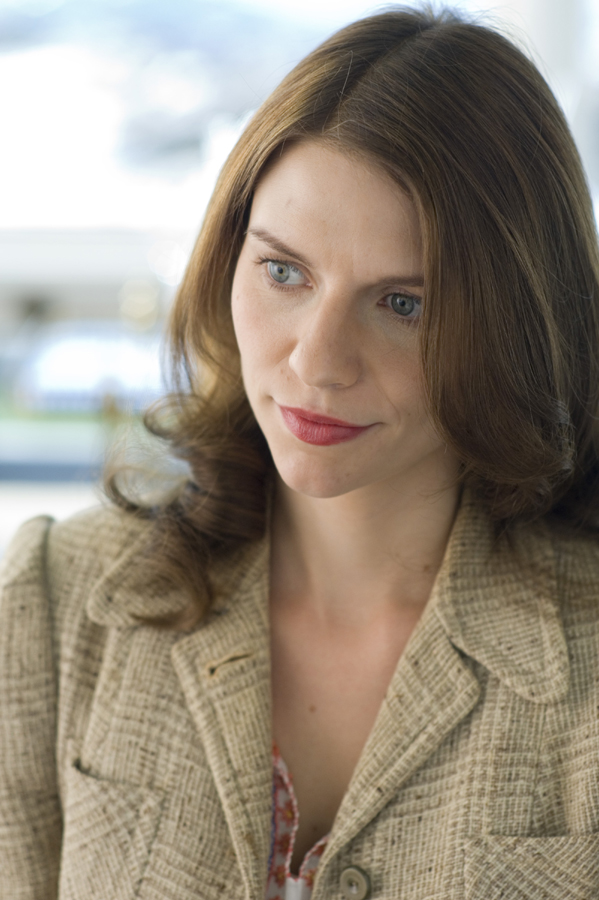 The
main character of Ann Lord is played in flashbacks by Claire Danes, who has
carved out an unique career for herself in the years since first capturing
our attention in the cult-favorite TV series My So-Called Life. Since
then, she has proven to be an unusually versatile actress, equally
comfortable in drama (The Hours and Brokedown Palace), splashy
melodrama (Romeo and Juliet), romantic
comedy (Shopgirl and The Family Stone) and big-budget action
(Terminator 3: The Rise of the Machines and The Mod Squad). Evening marks Danes’
reunion with screenwriter Cunningham, who also was behind The Hours.
The
main character of Ann Lord is played in flashbacks by Claire Danes, who has
carved out an unique career for herself in the years since first capturing
our attention in the cult-favorite TV series My So-Called Life. Since
then, she has proven to be an unusually versatile actress, equally
comfortable in drama (The Hours and Brokedown Palace), splashy
melodrama (Romeo and Juliet), romantic
comedy (Shopgirl and The Family Stone) and big-budget action
(Terminator 3: The Rise of the Machines and The Mod Squad). Evening marks Danes’
reunion with screenwriter Cunningham, who also was behind The Hours.
British actor Hugh Dancy plays Buddy, a tragic character from the past (and
one who was not in the novel.) Dancy has been acting professionally for less
than a decade, but he has put together a consistently interesting body of
work with films like Blackhawk Down, Blood and Chocolate, Ella Enchanted
and Beyond the Gates. (No one is perfect, though, he was also in
Basic Instinct II.) Dancy is currently finishing up a successful
Broadway run in the World War I drama Journey’s End.
Also from theatrical roots is Mamie Gummer, who has appeared in several
plays. Evening is her first major film role, though she has done
small parts in a few other films, most recently The Hoax. If Gummer
looks familiar to you, perhaps that is because she is a near-spitting image
of her mother when she was young. That mother just happens to be probably
the best actress of her generation – Meryl Streep. Now before you get any
ideas of nepotism, Gummer is the real deal as an actress. In fact, when she
was hired for the role of young Lila Wittenborn, director Lajos Koltai did
not even know of the relationship.
Only later did Streep come on board the cast of Evening – playing the
same character as her daughter grown old – and then it was not due to
Gummer’s actions. Streep was given the script by her long-time make-up
artist J. Roy Helland and was so taken by the script that she decided to do
a cameo role. Streep and Gummer were not the only mother/daughter team in
this production, either. Famed British actress Vanessa Redgrave played the
main character of Ann as a dying old woman in modern times and Ann’s older
daughter was played by Redgrave’s own flesh and blood, Natasha Richardson.
“It was a unique, very
special opportunity to play mother and daughter on the screen,” Richardson
said. “Not only to be playing these characters, but bring all our history,
all our baggage, all our love, all our painful times to serve these
characters in the film. It was great to be able to do that. It was also very
painful because it was evocative of a lot of things and seeing her lying
there on that bed, very convincingly, looking very seriously ill, it of
course makes you project the future and the past, like when my father was
dying. So, it was a very special experience.”
A
few weeks before Evening was due to debut, we met up with Danes,
Gummer and Dancy at the Regency Hotel in New York
to discuss the film.
What was it like to
work on certain scenes that seemed intense – like that rain scene with
Claire and Patrick [Wilson]?
Claire Danes:
They were so exquisitely written that I didn't have to work too hard to
analyze them or refine them. They just kind of play themselves. We read them
a couple of times in rehearsal, and it just worked. I think it was so clear
of what it was asking of us, that we had very little resistance, so we were
really fortunate. I love that scene. I love that scene to act and I love
the scene with Mamie in bed, because it was so…
Mamie Gummer:
Inventive…
Claire Danes:
…exciting to play because they have so many shifts and turns. They have a
great rhythm. A great integrity.
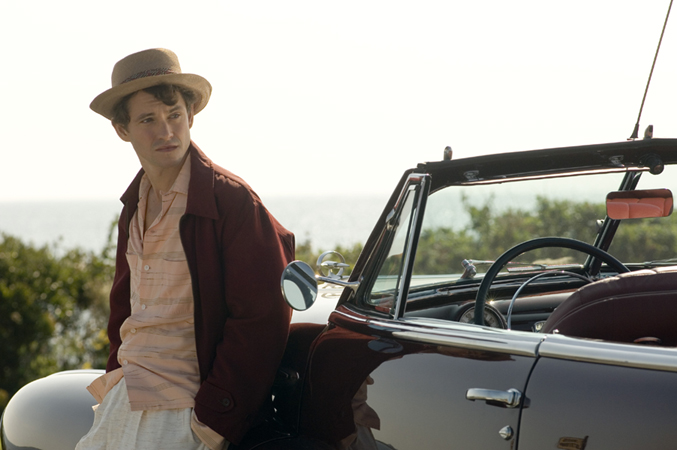 Hugh, did you find in playing this role with the tension between you and
Claire that it heightened your ability to connect with her?
Hugh, did you find in playing this role with the tension between you and
Claire that it heightened your ability to connect with her?
Hugh Dancy:
No, no, no. When you work with another person as an actor, nuances of
character in a relationship are a result of close understanding of the
script you’ve got and then the ability to realize it. I really do believe
that. I’m not just trying to avoid your question. I’ve worked with actors
before that I’ve liked very much and felt the results were not so wonderful.
And I’ve worked with actors and actresses that I really didn’t feel that
much for and felt like we achieved some kind of so-called chemistry. I think
it’s acting. That’s what it comes down to.
Mamie, what was you
favorite scene?
Mamie Gummer:
The bedroom scene was my favorite. The writing was just so beautiful. I
loved it from the minute I read the script. I just fell in love with that
character and that scene. I really didn’t have to do anything. You just say
the words, and how could your heart not break?
Claire Danes:
The onus was really on you in that scene and I was just having the best time
watching. (laughs from both) You didn't know.
Mamie Gummer:
I have sisters. I felt that the intimacy between girlfriends was lovely that
that was represented. Because you don't see that a lot in movies, laughing
and crying at the same time.
For this movie there are a lot of really strong roles for women – though of
course, Hugh, your role and Patrick’s were strong male roles. What was it
like working on a film that had so many big female roles from an actor’s
point of view?
Hugh Dancy:
It wasn’t so notable… I’m trying to think of how to formulate this… It was
great working with these great actresses. That’s a given. Working with
Claire and Mamie and Glenn and so on. And being aware that these other
actresses are also going to populate the other side of the story. But that’s
not to say that the experience was 100% estrogen. It didn’t particularly
feel like that in the moment – partially because I was there and Patrick was
there, but also because we were surrounded by crew. You know how it is. Even
more exceptional to me than just the presence of that many females in the
movie was the quality of the writing. The questions it tackled. Then the way
that – in my mind – it succeeded attacking these big questions. That felt
very clear, even when we were doing it. I felt it was something unusual.
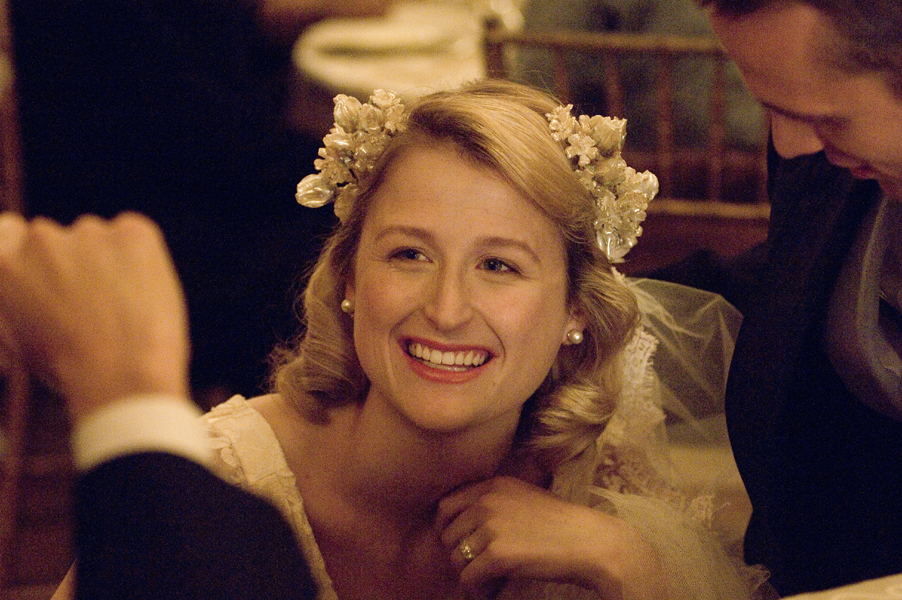 Is
there an underlying message here in choosing a mate? Is it okay to pass over
the true love and go with someone else – is that a regret your whole life?
Is
there an underlying message here in choosing a mate? Is it okay to pass over
the true love and go with someone else – is that a regret your whole life?
Mamie Gummer:
That's the big question. What's right? Lila seems to have compromised herself,
which is weak. But at the end, who's to say really?
Would that have happened today?
Claire Danes:
Sure. It still does happen today.
Mamie Gummer:
It's the pragmatic thinking.
Claire Danes:
It’s very hard to predict these things. But I think it's easy for Ann to
romanticize that affair because it was never fully realized. So it was
always perfect in her mind. I'm not even all that confident that it would
have lasted. They might not be true-life partners. But it served a purpose
for her. She enjoyed escaping into [it].
Mamie Gummer:
Nothing is perfect. The idea is just to be hopefully happy at the end of the
day.
Claire Danes:
Happy enough…
How do you feel about
the threesome in this film? Did they ever have a fighting chance?
Claire Danes:
The threesome?
You and Hugh Dancy's character and Pat's character…
Claire Danes:
I don't really see them as a threesome. I think they all loved each other.
The shades of those loves are very different. I don't think of them like
that.
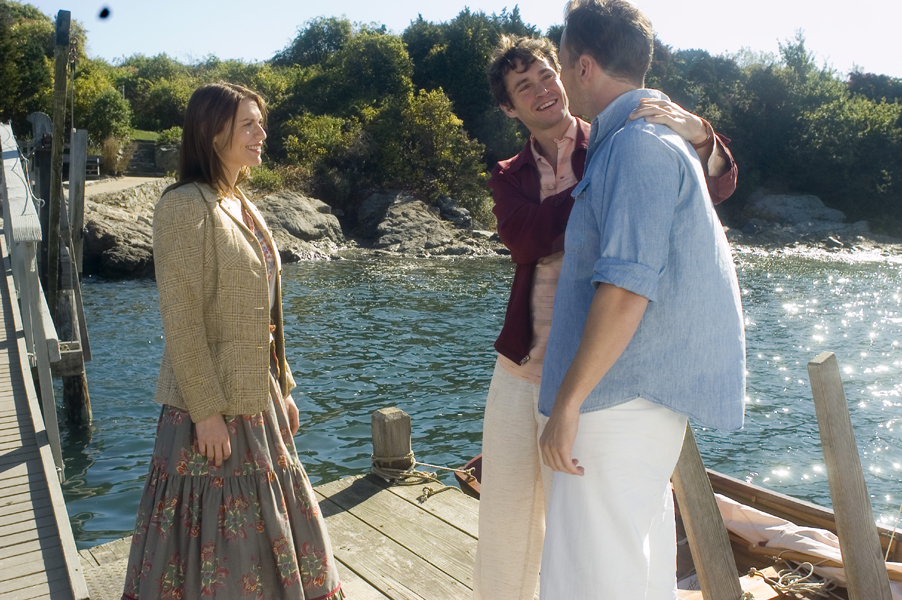 Hugh, did you have any specific idea as far as backstory about Buddy’s
sexual orientation?
Hugh, did you have any specific idea as far as backstory about Buddy’s
sexual orientation?
Hugh Dancy:
Yeah, sexual orientation, I thought was secondary. I don’t think it’s the
root of his confusions. In my imagination, my guess would be that he’s never
had any kind of homosexual experience. I mean, I don’t know this.
(laughs) I mean Michael Cunningham might have a different idea. Lajos
might have an idea. And they’re all right. But my theory is that he’s been
at college with Ann and probably gets very drunk and occasionally has kind
of gotten lucky with young girls who think that he is exotic and glamorous.
It’s always a bit tawdry. Every so often he gets really drunk and he tries
it on with Ann. I think that probably happens regularly in their
relationship. Every time she just pushes him away and he falls on the floor.
The one thing I do think is that Buddy has never been capable of really
maintaining any kind of substantial relationship, because he’s not grounded
in any way as a person. Man, woman, it doesn’t matter. His identity is to
him totally confused. That’s at the center of why he is in love with Ann, in
love with Harris. Because he just is drawn to towards… I think he wants to
be them, in a way. He sees Harris’ strength and his independence and thinks
that’s who I want to be. He sees Ann living the life of an artist in New
York. That’s what I want. He just grabs onto them.
I think personally
it’s always unique to the individual. There are certain social truths. But,
Buddy, for example, is living in a very interesting period. Where he is when
we see him in the movie in Newport is where he is still living in a kind of
throwback to the thirties or the twenties. Kind of wild Gatsby-esque times.
The rules are still the same. At the same time, three hours away in New
York, the beat poets are kicking in. Bohemian – the Village is coming up.
And he is a crossover. He has one leg in each world. He doesn’t really know
where he wants to be. That’s very specific to him and his particular
background.
So I do think
you’ve kind of addressed the issues of masculinity in doing these roles (in
Evening
and the play
Journey’s End.)
Do you have any insights into that, in terms of how it’s changed now? Since
you’re a modern guy today…
Hugh Dancy:
Yes, supposedly. (long pause) I mean, I suppose there is a less rigid
definition of what a man should be and should live up to. But, again, I
would resist making any broad statements about the world now. Because I
think it’s different from street to street. You could look at some cultures,
some backgrounds – it’s part ethnic and it’s part just family, whatever. In
Manhattan, where there would be an incredibly strong sense of masculinity –
you’ve got to be like this and like this – then of course there are other
areas of Manhattan where there’s just the opposite. And that’s just in
Manhattan. It so happens that in this movie and in this play there are very,
very strong rules applied. The guy in the play is living in the trenches.
He’s got a very ingrained sense of honor and duty, which was pounded into
these young men. You left your country. Just please run towards that machine
gun. Equally, Buddy is coming from a very rarified, atypical background. So
I don’t think they… well maybe my character in the play does, but Buddy I
don’t think is necessarily typical of that era. He is unusual.
But he’s grappling
with the issues…
Hugh Dancy:
He’s grappling with the issues of the era, yeah. But, you can see, I’m
trying to resist presenting myself as any kind of expert. What I would say
is that you don’t think about it in those terms when you’re doing this. You
just try and focus in on that guy and his family and his past and his
existence. And hope that the strength of the writing comes through. In turn,
that may be as you’re saying, some quality of the period comes through as
well.
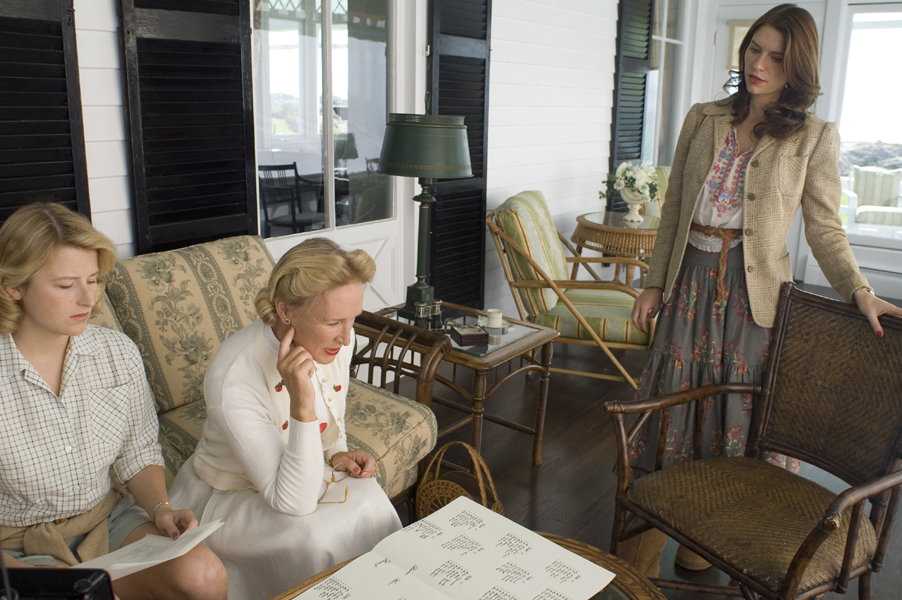 Mamie, did you have fun having an alternative mom (Glenn Close)? You looked
kind of like her, so it made sense.
Mamie, did you have fun having an alternative mom (Glenn Close)? You looked
kind of like her, so it made sense.
Mamie Gummer:
It’s funny. Roy Helland did the hair and makeup on this film. He's been my
mother's makeup and hair man for 25 years. He felt I looked more like Glenn
(laughs) than I did {my own mother].
Mamie, do you have
your own Roy or did you kind of borrow Roy?
Mamie Gummer:
I borrowed. I just asked really nicely.
Are you in the market for a Roy?
Mamie Gummer:
I'm not quite there yet. (chuckles)
Claire Danes:
I don't know that there are many Roy's to be had.
Mamie Gummer:
He’s one of a kind.
Claire Danes:
He really is unique.
Did you tease your mom at all about that?
Mamie Gummer:
No, but he was certainly her eyes and ears on the set.
Do you think your mom is going to keep piggybacking off your roles from now
on?
Mamie Gummer:
Who knows? (laughs) Maybe she'll leave me alone.
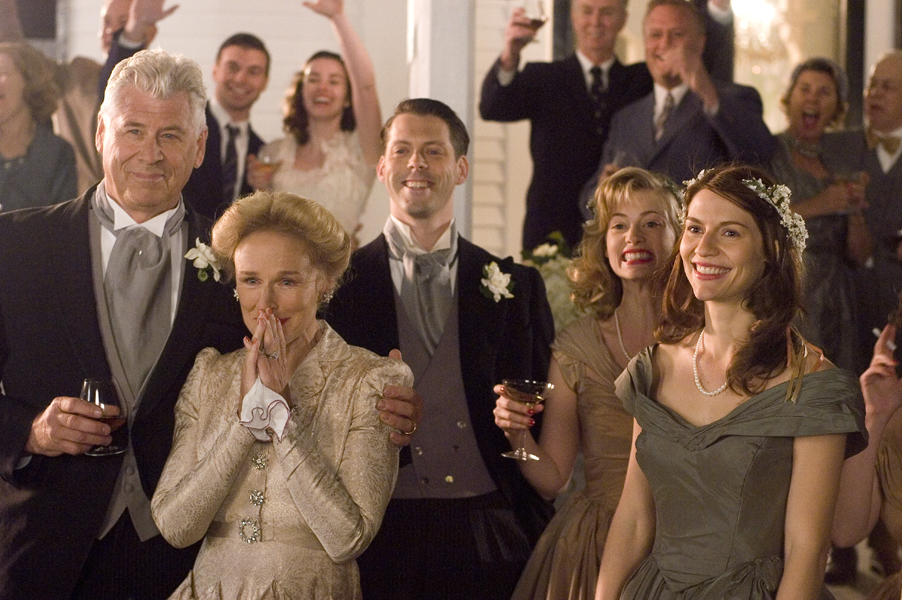 Buddy’s entire family is very repressed. They all show it in different ways,
but do you think that would be a hard lifestyle to grow up in?
Buddy’s entire family is very repressed. They all show it in different ways,
but do you think that would be a hard lifestyle to grow up in?
Hugh Dancy:
Maybe. For Buddy, yeah, but not for everybody. Some people love that.
(chuckles) Some people love rules. They want to know what to wear. I
know if I go to walk down the Kings Road in London, I’m going to see guys
wearing that uniform of the button down shirt and the red jeans and the
loafers and colored sports socks and a blazer. Did you never stop to think
maybe I’ll wear something else? They’re happy that way. I’m not saying
that’s repression, but there are a lot of different cultures that don’t
reward looking outside. I don’t think that has to be a bad thing.
Mamie Gummer:
But, I don't know that I would like [Glenn Close’s] character as a mother.
She kept this girl on a pretty tight leash.
Well certainly in
many of the films you’ve been in, Hugh – and the play – you’ve dealt with
that kind of repression. Maybe because of the British experience, but also
coming into that society. Also in the Rwandan film
(Shooting Dogs
a.k.a.
Beyond the Gates)…
Hugh Dancy:
Yeah. I mean, again I’m so wary of making sweeping statements…
Don’t worry, you’re not treated as an expert, but you’re treated as an
observer…I won’t elevate you to expert status.
Hugh Dancy:
That’s right. Expert Hugh Dancy embarrasses himself with sweeping
generalizations. (laughs) I suppose that may be true. I’ve never
selected anything with that in mind. It is feasible that unbeknownst to
yourself a trend emerges in the work that you do. You suddenly think, God, I
seem to have some access to the mindset of the outsider or whatever. I
really don’t know whether that’s true, or if it is why, but it may be the
case. I think usually it’s more interesting to see a character that is set
apart in some way. Eventually in fact every character has to be that way.
That’s what you’re looking for in every character. It’s the grain. Even if
the guy is 99% conventional, it’s the one extra percent that’s going to make
him worthy of having a story told about him. Usually that 1% if it’s a good
story is going to blossom and grow. So your job as an actor is to scrape
away and scratch away and find that strength. There’s an infinity of
variety. It can be anything.
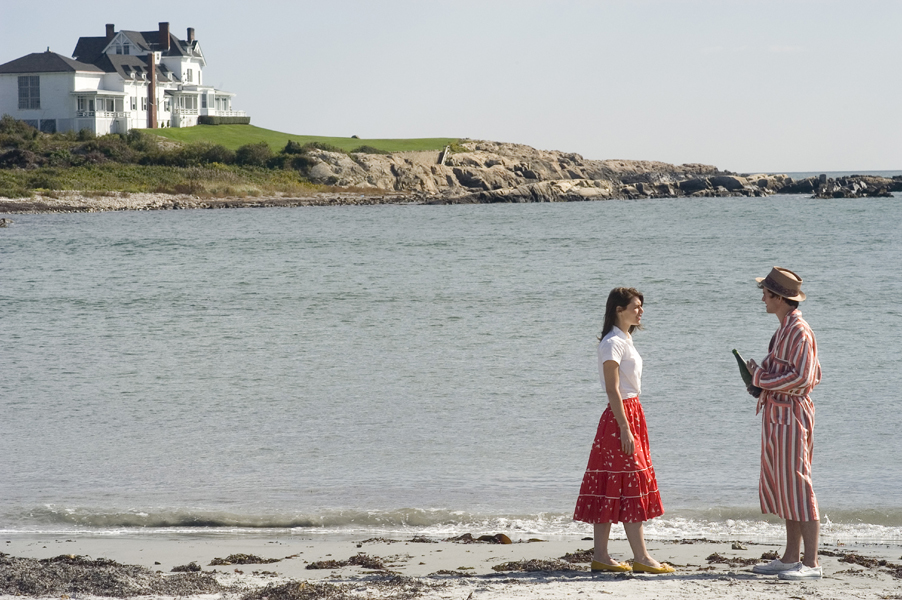 Some people think playing a drunk is easy, but I don’t think it would be…
Some people think playing a drunk is easy, but I don’t think it would be…
Hugh Dancy:
I don’t know I’ve met anybody who thinks that. I’ve been very gratified by
people telling me how hard it must be. It’s not. It’s not easy, because the
risk is you just really veer far too far.
But you have to do a lot of your own bringing the role out, right?
Hugh Dancy:
Well, you know, it’s difficult because you are trying to show who somebody
is, but through this extra layer of alcohol. Alcohol in some ways conceals a
person and in other ways it amplifies them. Eventually if you’re drinking to
repress some kind of aggression then somewhere down the line that evening
that aggression is going to resurface – maybe in a different light. So you
have to think it through very carefully. There is a character arc, despite
that. You also have to remember that a drunk is always fighting for control.
They’re not just stumbling around until they become uncontrollable. Like
Buddy, in the scene where he gives the speech at the wedding dinner, he is
trying to be a sober person. Speak like a sober person. So there is a lot to
think about.
Was there any improv?
Hugh Dancy:
There was no improv. I mean, there is always certain amount of invention,
but in terms of the script, no. Particularly playing a drunk character, the
last thing you want to do is start making up drunk dialogue. So no real
improvisation. In terms of director, it is very important, because it is my
belief that you can take a movie like this with one of the best scripts I’ve
ever read, an amazing cast, a beautiful setting and you can still screw it
up. There’s no guarantee. At the end of the day, it comes down to the one
guy who is going to put it all together.
Claire, what was it like to sing on film? You haven't done it before right?
Claire Danes:
No, I hadn't… and I wasn't teaming with confidence. But I had a great
teacher. Deborah Lapidus, who teaches at Juilliard and Tisch. She gave a
quick-but-thorough education on how to go about doing it. I didn't realize
what a physical undertaking it is to sing. I was very surprised by the
volume that I ended up producing. Like, “we can really make big noises!”
(laughs) It was spooky. But it was great. Great fun. I still take
lessons from her now just because I enjoyed it so much.
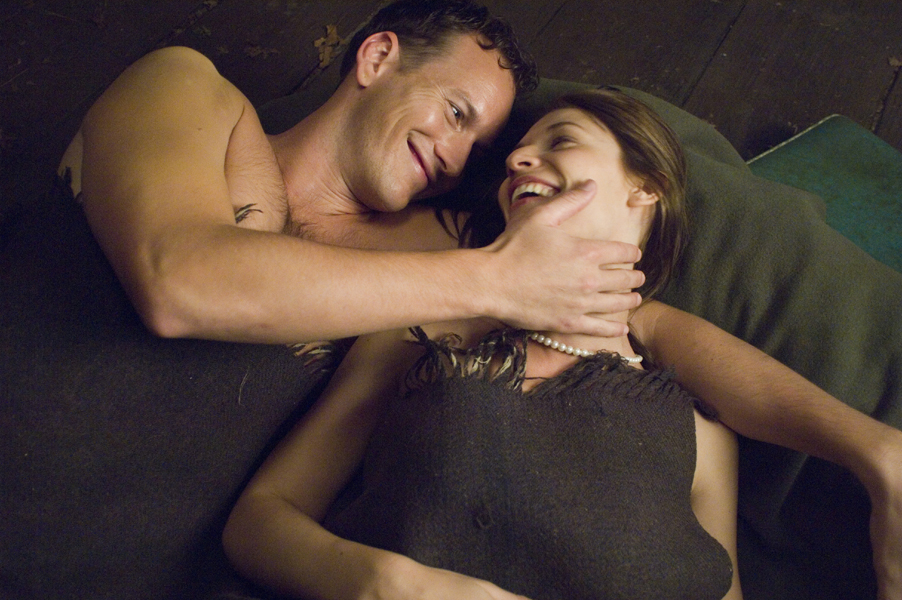 But you have established in your career a variety of other arts like
dancing. Do you hope to expand on that more?
But you have established in your career a variety of other arts like
dancing. Do you hope to expand on that more?
Claire Danes:
Sure…
Mamie Gummer:
Juggling…
Claire Danes:
Juggling. (laughs) I'm a mean juggler. And I can't whistle, at all,
which is just crushing.
It’s easy… There's a long, storied history of it in
music.
Claire Danes:
So people say! I'm not going to join in that history, sadly. I would like
to. But yes, I obviously want to be as dynamite and dexterous a performer as
possible so these opportunities are so welcomed. After I'm done taking
advantage of them, they are daunting but I feel kind of bigger now as a
performer and grateful.
Do you hope to use
your dancing skills in more of your films?
Claire Danes:
That would be wonderful. I love dancing and I think my dancing did serve me
in my singing because I have a sense of rhythm and timing. As I said before
singing is really physical. So I could organize it better, thinking in those
terms. I'm singing out of the back of my head and using my lower abdomen. So
bring it on.
Are there any personal processes as a UK actor of soaking up the idea of
Newport. It seems like to be in such opposition with the British experience…
Hugh Dancy:
Well, we invented elitism. (laughs)
Well, the British seaside seems much more about chips and throwing up on one
another…
Hugh Dancy:
Yeah, the British seaside is a different kettle of fish all together. That’s
true. So to speak. I mean, actually, the British would be me, Vanessa,
Eileen [and Natasha]. I was the only British actor who really had to be
really steeped in it, because Ann was not of that background and Eileen’s
character was from another planet. She is, she’s this kind of ethereal
being. So, yeah, the process was, we arrived on Labor Day weekend for the
weekend. Me, Patrick, Mamie, Claire, Lajos – and just hung out. Read some of
the scenes. Not all of them. Listened to a bit of music and talked. Got to
know each other and went to dinner and so on. Then they all went away and I
stayed there for the rest of the week. Which was great. I got to wander. I
think the idea was, he’s British, let him osmose. (laughs) So I did
what everybody else does in Newport and ate lobster and kind of got drunk.
(laughs again) It was strangely familiar. There is… it is such a
bizarre and unusual corner of the world. But there are qualities that are
not unique to Newport. That sense of propriety or rules as we were saying –
underneath what seems to be a very raucous group, a raucous society, are
these very strict rules. I can recognize that.
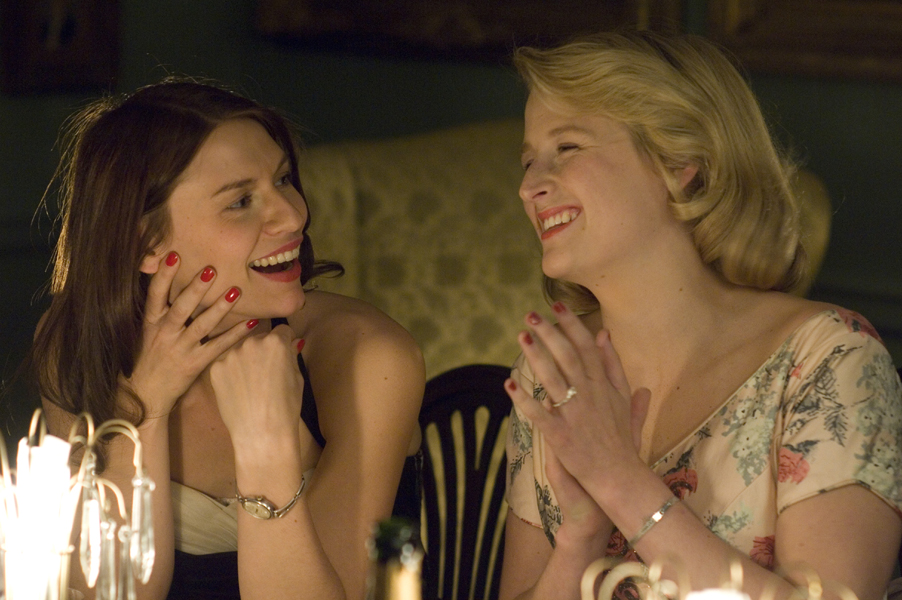 Do
you guys have have the kind of bond you had with each other
in the film at that age and will it last as these did?
Do
you guys have have the kind of bond you had with each other
in the film at that age and will it last as these did?
Mamie Gummer:
Ho's before bro's!
Claire Danes:
Well, as God, I feel… (laughs) I do have very different friendships
with women than I have with men. I hope that they will last.
I think women struggle more to keep those friendships going…
Claire Danes:
Yeah. In some ways, they do. They are unpredictable. One of my oldest
friends – it still surprises me that we have so much in common. Like really?
We are compatible? I never would have picked that necessarily. But
life did. It’s a combination. It's a funny thing, because there's never a
formal ceremony. You don't sign anything where you say I will always through
thick and thin, through the good times…
Mamie Gummer:
But there is that moment when you look at each other and say, okay we're…
Claire Danes:
(big laughs)
Sometimes there is a handshake involved.
So did you guys establish a rapport to work together again?
Claire Danes:
We had our moments, but I'd love to work with Mamie again.
Mamie Gummer:
We all got along together. But it's not necessary to be someone’s best
friend to play their best friend. That’s sort of an acting thing…
What are you doing next?
Claire Danes:
I have Stardust and a movie I did a while ago – The Flock –
coming in September.
Mamie Gummer:
I have Stop Loss coming out in September and John Adams.
What was it like working with Kim Pierce?
Mamie Gummer:
Great! She's brilliant. A little nutty, but great. She's wonderful.
Hugh, how are you
approaching
The Jane Austen Book Club?
Hugh Dancy:
Well, he stands out in the context of that movie in the beginning because he
has never read any Jane Austen. He’s the only guy in there. He gets almost
accidentally invited into this book club, because one on the women thinks
one of the other women who has just gotten a divorce might like him. He
misunderstands the situation and thinks the first woman wants him. He’s just
a kind of schlub and a computer nerd who reads science fiction
sitting in a room full of women who are Jane Austen experts. I didn’t really
need to work on the outsider status on that one.
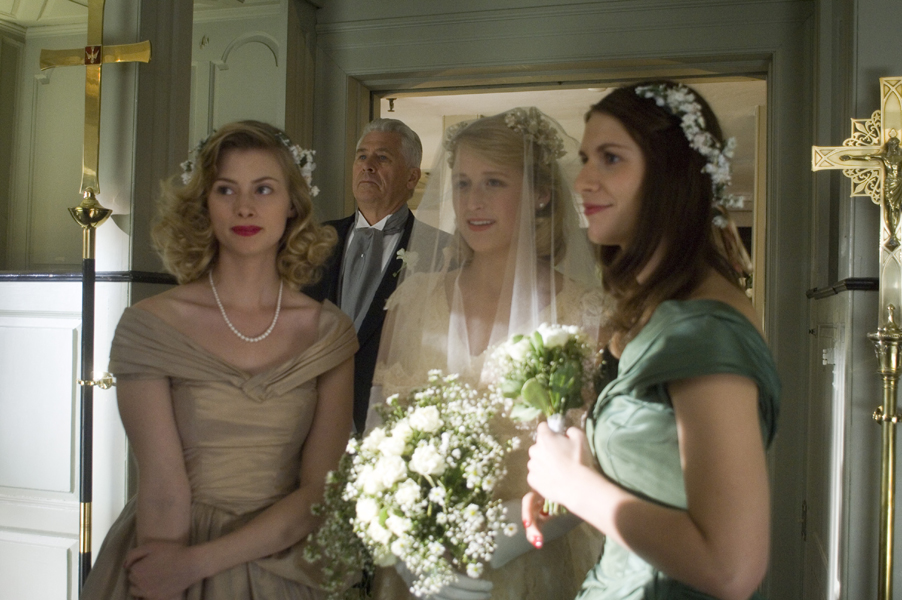 Might we be seeing you on stage?
Might we be seeing you on stage?
Mamie Gummer:
I'm doing a play in August in Williamstown. It's a Lillian Hellmann play.
(Screenwriter) Michael (Cunningham)’s writing seems to have a theatrical
quality – as if it were set for a play. Did you find that to be the case?
It’s very dialogue driven.
Hugh Dancy:
To put it another way, it’s true that there are movies that don’t rely on
dialogue so much. But usually that’s simply because the writing’s bad.
(laughs) I think in general dialogue ought to always form the
characters. It’s just that they don’t always achieve that. It’s amazing to
me to read writing that is supple and fluid and rooted in the moment and the
situation and yet gives such a strong sense of character. I agree that
there’s a kind of heightened drama to it. But I think that’s in the
situation. And particularly a wedding, which is inherently theatrical – like
a court case or something. There is always a kind of theater involved. But
what I liked about it, particularly with Buddy, is he’s wrestling away with
the same questions but in a much more dramatic way. I couldn’t have done it
and I wouldn’t have felt comfortable going to those excesses if it hadn’t to
me tied down in reality and rooted in honesty. If it was just grandiose, all
written in a dramatic way, I would have been very uncomfortable.
What did Michael do on the set? Was he involved in the filming or there as
more of a producer?
Mamie Gummer:
He was sort of Jack-of-all-trades. He did it all from Scrabble…
Claire Danes:
Scrabble partner…
Mamie Gummer:
…to consultant of the story – having written the thing.
Hugh Dancy:
Michael was on the set a lot, yeah.
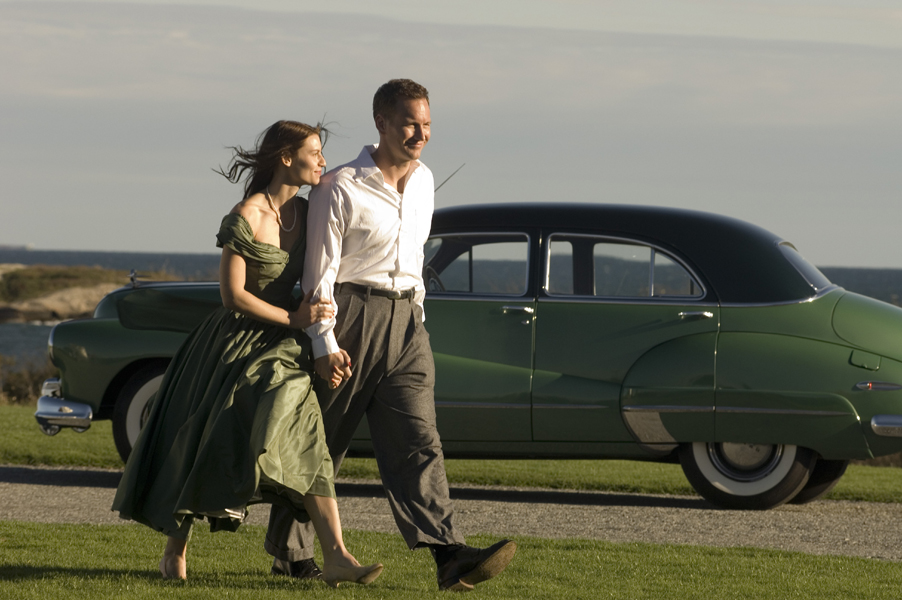 Did you discuss with him his sexuality? I know it was kind of a pre-gay
period…
Did you discuss with him his sexuality? I know it was kind of a pre-gay
period…
Hugh Dancy:
(laughs) Pre-gay period. I don’t know if that period ever existed.
But I know what you mean. Certainly, it’s not like we could imagine that,
oh, maybe if there had been a future for Buddy beyond this movie he could
have suddenly jumped up at the wedding and come out. No. No. But, I’ve got
to say. Michael was there. We didn’t talk about that issue in particular. I
don’t think we ever talked about this. I mean we may have flippantly, but I
don’t think we ever sat down and talked about his sexual orientation. I
think we may have had one or two more or less inebriated discussions about
Buddy as a guy. That’s partially because I was doing a lot of work on my
own, just trying to think it all through. Like I got the work done. When you
do all that work on your own and you feel like you’ve gotten somewhere you
want to rush off and share it with somebody. When you’ve got the dude that
wrote the script it’s great. You’ve just got to bore him for a half hour. If
he’s polite – and Michael is – he just nods and agrees and lets you get on
with it. When I read the book and realized he didn’t exist in the book – and
I was fascinated by Buddy anyway – I thought I’m going to ring Michael and
kind of get the inside line. And I just put it off and put it off. I
eventually arrived in Rhode Island and met him and I was very glad I had. By
that time I realized I didn’t need to. I felt comfortable pursuing it
myself. I still haven’t really had that conversation with Michael. I doubt I
ever will.
Mamie, at your point in your career, with your mom – does she give you
pointers or is she hands off?
Mamie Gummer:
We weren't on the set at the same time, because we were the same person and
due to space and time limitation we didn’t have any scenes.
I knew that, I just
thought you may have been there for some of each others’ scenes.
Mamie Gummer:
If I have a question or problem I'll usually ask her, but on this project I
had a handle on it.
Claire did you have an
opportunity to talk with Vanessa about her being you in latter years?
Claire Danes:
We had a conversation that didn't last very long. It digressed pretty
quickly into talk of [other things]. I think it was really obvious after a
certain point that we were afforded a lot of liberties in forming our
characters. Because the gap in age was so massive, it was impossible to
carefully design that arc. Also Ann is so sick, and weaving in and out of
consciousness and is behaving
uncharacteristically. It was pretty freeing.
How did you feel having your mother play a later version of you? How was
that to see it evolve? Was there a connection between the young version and
the old one?
Mamie Gummer:
I was very happy with her work. She did an adequate job playing me. We
didn't have a formal sit down conversation about continuity or character
choices. You're introduced to this character at a very young age of 24. Even
though she thinks she’s an old maid, she’s just 24. And then [you don’t see
her] again until she's 70. So, she’s lived a full life that we couldn't
really start to imagine.
When you see the movie finished, I kept expecting for Buddy to disintegrate.
But his fate seems so much more random. When you saw it, even though you
knew it in the script, when you saw it on the screen did it have a different
impact on you?
Hugh Dancy:
I think it’s just a brilliant piece of writing. It’s so well set up. I don’t
want to give away the end of the movie. I don’t want you to give away the
end of the movie, either. But, yeah, you know, Buddy from the minute he
arrives you pretty much think you are going to figure out where he’s going.
And the movie, like any good movie, defies your expectations. So, yes, even
though I knew that, I was still taken by how successful that was when I went
to the movie.
Email
us Let us know what you
think.
Features
Return to the features page.